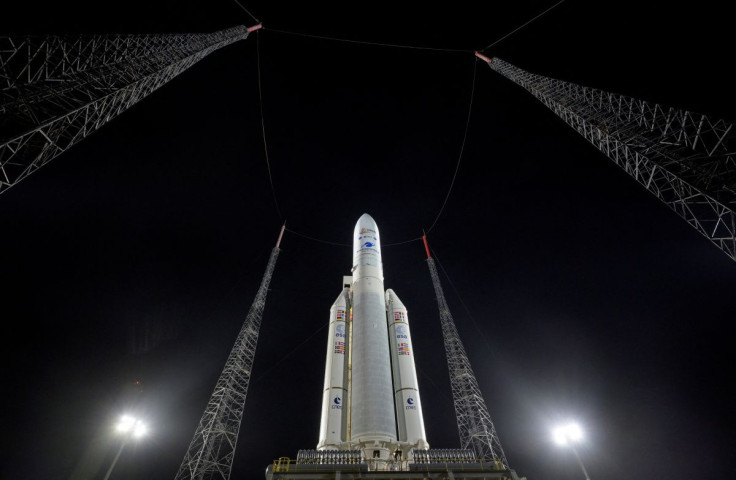Failed Rocket Launch: Ukraine Pushes Back On Investigation Putting Blame On Ukraine-Made Part
KEY POINTS
- The Vega C rocket failed mere minutes after launch in December 2022
- An investigation was immediately launched to determine the cause of the failure
- Ukraine does not agree with the results of the investigation
The results of the investigation on a December 2022 Vega C rocket launch failure, which cites a specific Ukraine-made part as the "cause of the failure," has recently been released. Ukraine is now pushing back against the results, calling them "premature."
The Vega C VV22 mission failed some two minutes and 27 seconds after liftoff from French Guiana in December. The mission was carrying two satellite payloads and upon the failure due to an "anomaly" on the Zefiro 40 rocket motor, an Independent Enquiry Commission was tasked with investigating the source of the failure.
Arianespace, the launch service provider, released the results of the initial investigation on March 3, noting that the source of the failure was a "gradual deterioration of the Zefiro 40's nozzle." This was reportedly a component that Italian company Avio bought from a Ukrainian company.
"Additional investigations led to the conclusion that this was likely due to a flaw in the homogeneity of the material," Arianespace said in its news release. "The anomaly also revealed that the criteria used to accept the C-C throat insert were not sufficient to demonstrate its flightworthiness. The Commission has therefore concluded that this specific C-C material can no longer be used for flight."
There was reportedly "no weakness" identified in the Zefiro 40's design.
"Thanks to their hard work, the members of the Commission have identified the immediate cause of the loss of the mission VV22 and of its lessons learned, and proposed the relevant corrective actions," Stéphane Israël, CEO of Arianespace, said in the news release, adding that Avio is already implementing the commission's recommendations.
But Ukraine, for its part, is pushing back on the results of the investigation. In a statement released Monday, the State Space Agency of Ukraine noted that the statement about the results of the investigation did not leave room for further discussion and "casts a shadow over the reputation of the space industry of Ukraine."
The conclusions, it said, were still "premature" and would need to be investigated further.
"Even under conditions of the war the Ukrainian space industry continues to treasure its image of the reliable partner in the world space market and makes every effort to support it with timely delivery of the services and products of the high quality to our international partners," the space agency noted.
It stressed that the products it provided were "completely compliant" with the requirements and that the considerations of the Ukrainian specialists who were a part of the investigation "did not find reflection in the conclusions of the Independent Enquiry Commission."
Noting that there could still be some other factor that may have led to the Vega C launch's failure, it encouraged further investigations on the matter.
"Whatever reasons could have rushed our European colleagues with the recent Statement, the State Space Agency of Ukraine encourages our European partners to perform additional analysis and considerations that would take into account other potential factors as well as suggestions diligently proposed by the Ukrainian experts," the agency said, emphasizing its commitment to do its part for the success of its partners' "ambitions space endeavors."
This grounding of the Vega C rocket in 2022 reportedly marked yet another setback for Europe's launch capabilities. Two other Vega rockets also experienced issues in recent years, while Ariane rockets have also experienced setbacks and delays.
As for the Vega C, European Space Agency (ESA) Director-General Josef Aschbacher said the agency will allocate €30 million ($32 million) to replace the part and perform more tests. The Vega C is aimed to resume launches by the end of 2023.

© Copyright IBTimes 2025. All rights reserved.






















